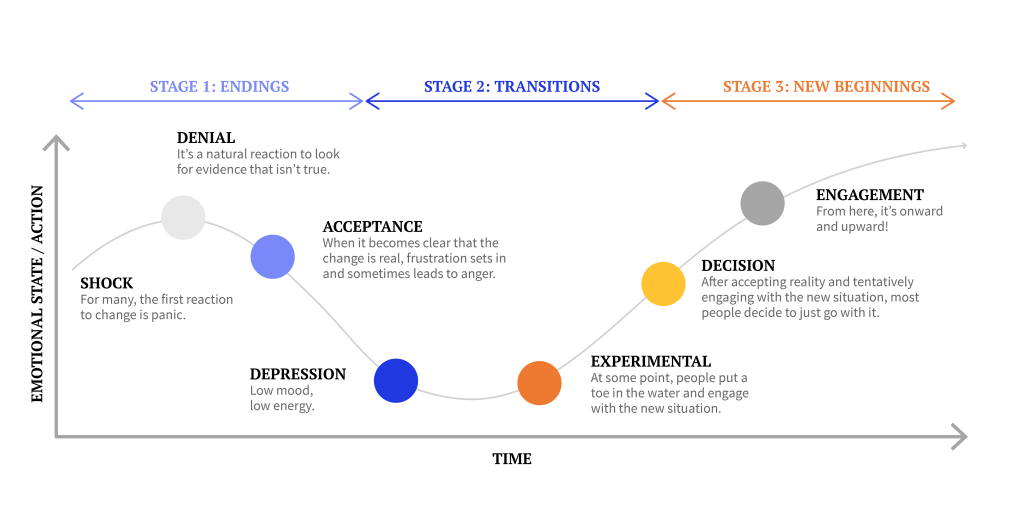The psychology of change is a fascinating field that illuminates how our minds navigate the inevitable transformations in our lives. As we delve into this intricate subject, we find that personal growth and self-improvement intertwine with our capacity to embrace change. Supported by groundbreaking research, such as the Harvard Study on Adult Development, we discover that our attitudes toward change can shape our psychological well-being. Moreover, understanding implicit bias allows us to recognize the nuances in how we perceive ourselves and others during times of transition. Change, while often resisted, holds the potential for profound growth when we learn to embrace it fully.
Exploring the dynamics of transformation within ourselves reveals a more nuanced understanding of human behavior. The concept of personal evolution invites us to reconsider our relationship with the shifting narratives of our lives, compelling us to engage actively in our development. By analyzing the influences of societal pressures and personal experiences, we uncover barriers to embracing change, including the subtle yet pervasive presence of implicit biases. As we consider the implications of the extensive Harvard Study on Adult Development, we gain insight into the secrets of resilience and the pursuit of self-betterment. Ultimately, by redefining our approach to change, we create pathways for healthier, happier lives.
Understanding the Psychology of Change
Change is an intrinsic aspect of human existence, often linked to personal growth and development. The psychology of change recognizes that the way individuals respond to change can vary greatly. Some embrace it as an opportunity for self-improvement, while others resist it out of fear or discomfort. According to the Harvard Study on Adult Development, consistent engagement in the process of change can lead to greater happiness over time. Furthermore, understanding the underlying psychological mechanisms can help individuals navigate through their reluctance and effectively harness the potential of change.
Experiments conducted by experimental psychologists highlight how people’s implicit biases and self-perceptions can shift as they process new information and experiences. This shifting perspective can either open the door to embracing change or create barriers that hinder personal growth. As human beings, we are more than our habits; we are constantly evolving. This is further amplified when we confront disillusionment, which, as discussed in Harvard’s various educational circles, can serve as a catalyst for significant change. Yet, despite the challenges, understanding the psychology behind change not only empowers us but also enhances our relationships with others, fostering a more empathetic society.
Embracing Change: A Pathway to Personal Growth
Embracing change is essential for personal growth, as it enables individuals to break free from the constraints of existing biases and routines. The process of change often ignites the pursuit of self-improvement, keeping us aligned with our goals and aspirations. The trends identified in the Harvard Study on Adult Development illustrate how those who actively seek to understand and reshape their trajectories tend to experience increased life satisfaction and happiness. With each step taken forward, we begin to build resilience and adaptability, crucial traits for navigating life’s uncertainties.
Furthermore, research indicates that when we consciously choose to embrace change, we reinforce our capacity for adaptability. Engaging with various perspectives, like those explored in the podcast ‘Harvard Thinking,’ reveals how personal stories and social contexts shape our understanding of change. From adjusting to new roles in society to overcoming implicit biases, the act of embracing change fosters deeper connections with ourselves and others. Ultimately, viewing change as a journey rather than a destination allows for continuous evolution and growth.
Impacts of Implicit Bias on Change
Implicit biases often shape our perceptions and responses to change in profound ways. These biases, which are formed from personal experiences and societal influences, can hinder our ability to appreciate the role of change in our lives. In discussions surrounding the Harvard Study on Adult Development, it becomes evident that acknowledging implicit biases is crucial for breaking down barriers that prevent us from acting constructively in our personal and professional journeys. When faced with new situations, our biases can cloud our judgment, leading to resistance against change.
Conversely, understanding how implicit biases manifest can empower individuals to consciously challenge and redefine their beliefs. This introspective approach not only allows us to embrace change but also offers a unique lens through which we can examine our relationships with others. If we actively work to acknowledge and reduce our biases, as explored by experts like Mahzarin Banaji, we can create space for empathy and understanding, ultimately facilitating a more inclusive response to the changes occurring in our lives and society.
Overcoming Resistance to Change
Resistance to change is a common human experience often rooted in fear of the unknown. Many individuals prefer stability over uncertainty, which can stifle their growth and personal development. The insights shared by experts in the podcast ‘Harvard Thinking’ reveal that while change can be daunting, it is also necessary for evolution and improvement. Those who are aware of their resistance are more likely to find strategies to overcome it, allowing them to step into new experiences that can enhance their self-development.
Understanding the psychological aspects behind change resistance is essential for fostering a growth mindset. Embracing discomfort can lead to transformative experiences, as noted by Robert Waldinger in past studies. Thus, engaging with strategies such as setting small, achievable goals or surrounding oneself with supportive individuals can alleviate apprehension and motivate action. By redefining our relationship with change, we can approach new life circumstances with curiosity rather than trepidation.
The Role of Disillusionment in Change
Disillusionment is a powerful catalyst for change, often prompting individuals to reassess their values, beliefs, and aspirations. Discussing the experiences of disillusionment, Richard Weissbourd highlights that such feelings can lead to two divergent paths: withdrawal into cynicism or a renewed commitment to understanding and adapting to reality. Engaging with disillusionment positively can foster personal growth and lead to deeper self-awareness as individuals strive for more meaningful existence.
As people confront their own disillusionments, they may discover new directions in their lives that they previously overlooked. The counterintuitive relationship between disillusionment and optimism can propel individuals toward healthier attitudes and choices, emphasizing resilience as a key component of personal development. Thus, navigating disillusionment can ultimately enrich one’s path to self-improvement and propel one toward embracing change.
Personal Experiences and Change Adaptation
Personal experiences greatly influence one’s ability to adapt to change. The narrative surrounding life transitions reveals that as we age, our perceptions of change shift significantly. Reflected in the Harvard Study on Adult Development, common experiences across adulthood—from relationships to career adjustments—illustrate how we grow through various life stages. Adaptation often necessitates self-reflection and willingness to revise our personal narratives, a key factor in successfully navigating change.
Additionally, our innate responses to life’s turning points can reveal much about our temperament and willingness to embrace change. As Mahzarin Banaji notes, personality traits established early on may determine how we respond to life’s challenges. Recognizing these patterns within ourselves allows for more intentional adaptations, promoting growth throughout our entire lives. Thus, weaving our individual experiences into the fabric of our understanding underlines the personal nature of how we relate to change.
Cultural Perspectives on Change
Cultural narratives play a significant role in shaping how individuals perceive and respond to change. In many Western societies, change is often viewed as an opportunity for self-improvement and personal success, reflected in the booming self-help industry. Contrastingly, other cultures may emphasize communal stability and continuity over individual change, showcasing the diversity in our attitudes towards adaptation and transformation. This cultural dichotomy affects not only personal development but also societal progress.
Engaging with cultural perspectives offers valuable insights into the complexities surrounding change. The scholarship from experts like Robert Waldinger reveals that cultural norms are intertwined with psychological responses, influencing how disillusionment and transformation are experienced across societies. Recognizing these cultural underpinnings encourages us to embrace a broader understanding of change, allowing for greater empathy towards diverse experiences and ultimately enriching our own personal growth journeys.
Navigating Change Through Lifelong Learning
Lifelong learning is a key element of effectively navigating change in our personal and professional lives. Engaging with new information and experiences continuously sharpens our adaptability, making us better equipped to handle future transformations. As articulated in ‘Harvard Thinking,’ embracing lifelong learning not only enhances our intellectual pursuits but also fosters growth in emotional intelligence and social understanding, integral traits for thriving in an ever-changing world.
Moreover, adopting a mindset of lifelong learning promotes resilience, encouraging individuals to view challenges as opportunities for development. By connecting the goal of self-improvement with ongoing education and experience, we can lessen the fear of change. Continuous learning allows us to remain agile and openhearted in the face of life’s inevitable transitions, ensuring that we actively participate in shaping our evolving selves.
The Interplay of Self-Improvement and Change
The relationship between self-improvement and change is a vital aspect of human experience. Driven by the desire to grow, many individuals actively seek to change their habits, perspectives, and lifestyles. This pursuit of self-improvement is sometimes fueled by external influences, such as societal expectations or personal goals. Understanding this interplay can illuminate the ways in which change shapes our identities and life narratives.
However, the pressure to consistently improve can also yield psychological burdens, leading to feelings of inadequacy or perpetual dissatisfaction. The insights from experts like Weissbourd and Waldinger suggest that achieving balance is essential. Accepting oneself while simultaneously striving for growth creates an environment conducive to positive change. By recognizing that self-improvement does not negate self-acceptance, individuals can embark on personalized journeys of change that highlight their unique experiences and aspirations.
Frequently Asked Questions
What is the psychology of change and its impact on personal growth?
The psychology of change encompasses how individuals adapt to new circumstances and develop over time. It plays a crucial role in personal growth by enabling people to embrace change, overcome challenges, and ultimately thrive. Understanding this psychology can help individuals recognize their potential for self-improvement and the importance of mindset in their journey of change.
How can individuals effectively embrace change according to psychological principles?
Embracing change is essential for personal development. Psychologically, individuals can effectively adapt by adopting a growth mindset, which encourages resilience and openness to new experiences. Techniques such as setting achievable goals, seeking support from others, and practicing mindfulness can facilitate this transformative process, helping individuals to not only cope with change but to thrive as a result.
What does the Harvard Study on Adult Development reveal about the psychology of change?
The Harvard Study on Adult Development provides profound insights into the psychology of change, indicating that personal growth is possible at any stage in life. It showcases that relationships play a significant role in long-term happiness and that individuals can experience significant transformations in their perceptions and behaviors as they age, contrary to the belief that people remain static over time.
How does implicit bias relate to the psychology of change and personal growth?
Implicit bias reflects subconscious beliefs that can influence behavior and decision-making. The psychology of change emphasizes that these biases are not fixed; rather, they can evolve over time as individuals gain new experiences and education. By becoming aware of and challenging these biases, individuals can foster personal growth and create more inclusive environments.
What role does self-improvement play in the psychology of change?
Self-improvement is a vital aspect of the psychology of change, motivating individuals to seek better versions of themselves. Recognizing the inevitability of change, individuals can harness self-improvement strategies such as goal-setting, reflection, and feedback to shape their paths. This pursuit of self-betterment not only enhances personal satisfaction but also encourages a proactive approach to life’s challenges.
| Key Point | Details |
|---|---|
| Resistance to Change | Resisting change leads to suffering, while embracing it can lead to personal growth. |
| Nature of Change | Change is constant and occurs both intentionally and subconsciously. People underestimate their capacity for change. |
| Impact of Age | Significant changes occur throughout adulthood as well as in childhood, challenging the myth that people only change as children. |
| Disillusionment and Growth | Disillusionment can lead either to bitterness or to a deeper understanding of reality. |
| Implicit Bias | Our biases are not static; they can change through new experiences. |
| Cultural Factors | Cultural influences shape individuals’ openness to change, with some being more adaptable than others. |
| Fear of Change | Fear of the unknown can inhibit personal change, leading to resistance. |
| Emotional Responses | Experiences of trauma can lead to harmful changes, stressing the importance of context in the psychology of change. |
Summary
The psychology of change emphasizes that change is an inevitable and necessary part of human life. Understanding how we respond to change—whether through fear, resistance, or acceptance—holds the key to personal growth and psychological well-being. Embracing change can empower individuals to reshape their identities and improve their life satisfaction, suggesting that despite our fears, change can ultimately lead to a more fulfilling existence. Therefore, we must cultivate an awareness of the nature of change and recognize our innate capacity to evolve throughout our lives.



